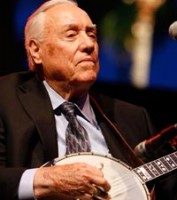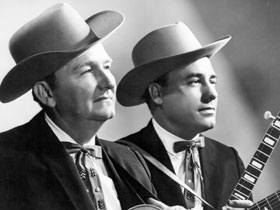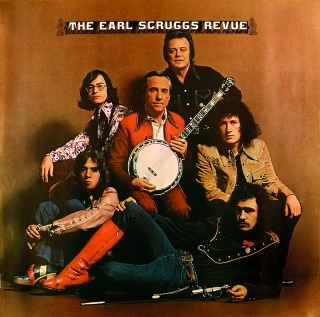
 Bluegrass legend Earl Scruggs died March 28, 2012 in a Nashville area hospital at age 88. When asked about the banjo pioneer’s career, most who knew him site his kindness first and his musical achievements second.
Bluegrass legend Earl Scruggs died March 28, 2012 in a Nashville area hospital at age 88. When asked about the banjo pioneer’s career, most who knew him site his kindness first and his musical achievements second.
From early commercial success with The Beverly Hillbillies theme “The Ballad of Jed Clampett,” to a Grammy Lifetime Achievement Award in more recent years, Scruggs captivated generations of musicians and music lovers.
Historian Robert K. Oermann explains, “He was such a sweet soul. No one in any genre of music has so profoundly influenced the playing of his or her instrument the way Earl did.”
Earl Eugene Scruggs was born in Flint Hill, NC on Jan, 6, 1924 and by his teens had developed a unique three-finger style of banjo picking that would revolutionize the genre. In 1945 he met future duo partner Lester Flatt, when both were members of the landmark group Bill Monroe’s Blue Grass Boys.
In a recent column for The New Yorker, Steve Martin wrote, “Some nights [Earl] had the stars of North Carolina shooting from his fingertips. Before him, no one had ever played the banjo like he did. After him, everyone played the banjo like he did, or at least tried. In 1945, when he first stood on the stage at the Ryman Auditorium in Nashville and played banjo the way no one had ever heard before, the audience responded with shouts, whoops, and ovations….There aren’t many earthquakes in Tennessee, but that night there was.”

Flatt & Scruggs
By 1948 Flatt and Scruggs left Monroe’s band and formed the Foggy Mountain Boys, which later become known simply as Flatt & Scruggs. Together, they popularized bluegrass throughout the fifties and sixties with national television spots such as The Beverly Hillbillies, with performances at famed events including the Newport Folk Festival, and a morning radio show on WSM in Nashville, sponsored by Martha White Flour.
Jody Williams, BMI VP Writer/Publisher Relations, reflects on Scruggs, a lifelong BMI writer. Williams’ uncle also booked Flatt & Scruggs for the original Martha White commercial. “He was traditional, and at the same time he was avant garde,” muses Williams. “With Flatt and Scruggs he defined the banjo, taking it from rural stages to the Opry, then college campuses in the ’60s, all the way to Carnegie Hall. He is an architect of the genre of bluegrass. It’s popularity would never have soared without Earl…We salute his contribution to American music. Our thoughts and prayers are with the Scruggs family.”
The duo called it quits in 1969 and continued separate careers. Flatt died in 1979, and the duo was inducted into the Country Music Hall of Fame in 1985.
“Earl Scruggs was the single most important instrumentalist in Bluegrass music,” explains Tony Conway. “Along with Bill Monroe, Earl Scruggs was responsible for helping create a much larger audience for the format of Bluegrass, particularly a new and younger fan base. He was always a first class Gentleman.”
Family played a significant role in Scruggs’ career. His wife Louise, who died in 2006, is credited with steering his remarkable success and was a pioneering female in the music business in her own right.
 Scruggs teamed with sons Randy and Gary for the Earl Scruggs Revue in 1969. The group veered into folk-rock territory and included a rotating cast of musicians, including Randy and Gary’s brother, Steve. In 1972 Earl, Gary and Randy played on the Nitty Gritty Dirt Band’s landmark album Will The Circle Be Unbroken.
Scruggs teamed with sons Randy and Gary for the Earl Scruggs Revue in 1969. The group veered into folk-rock territory and included a rotating cast of musicians, including Randy and Gary’s brother, Steve. In 1972 Earl, Gary and Randy played on the Nitty Gritty Dirt Band’s landmark album Will The Circle Be Unbroken.
Scruggs’ achievements earned numerous accolades including a National Heritage Fellowship, and the National Medal of Arts. He was inducted into the IBMA Hall of Fame in 1991. Even late in his career the honors kept coming. His album Earl Scruggs and Friends won a Grammy in 2001, one of three Grammys he earned between 1998 and 2004, as well as a 2008 Grammy Lifetime Achievement Award.
Nashville writer Holly Gleason recalls him fondly, including friendly encounters at the most modest of restaurants, the Waffle House. “When you make the musical mark Earl Scruggs did, you won’t ever be gone,” she sums. “People will listen to his records and marvel; pick up their instrument and practice the complicated three fingers rolls, the wildly accelerated picking. His mark shall last forever. So will his soul.”
Scruggs’ health waxed and waned in recent years, including a September 2010 hospitalization in North Carolina for an undisclosed illness.
He was preceded in death by his son Steve, and wife Louise.
The family will receive friends during visitation Fri., March 30 and Sat., March 31 between 3 – 7 p.m. at Spring Hill Funeral Home, 5110 Gallatin Pike, Nashville. Funeral services will be held Sun., April, 1 at 2 p.m. at the Ryman Auditorium. In lieu of flowers, donations may be made to the Country Music Hall of Fame & Museum or the Earl Scruggs Center.

About the Author
Sarah Skates has worked in the music business for more than a decade and is a longtime contributor to MusicRow.View Author Profile


